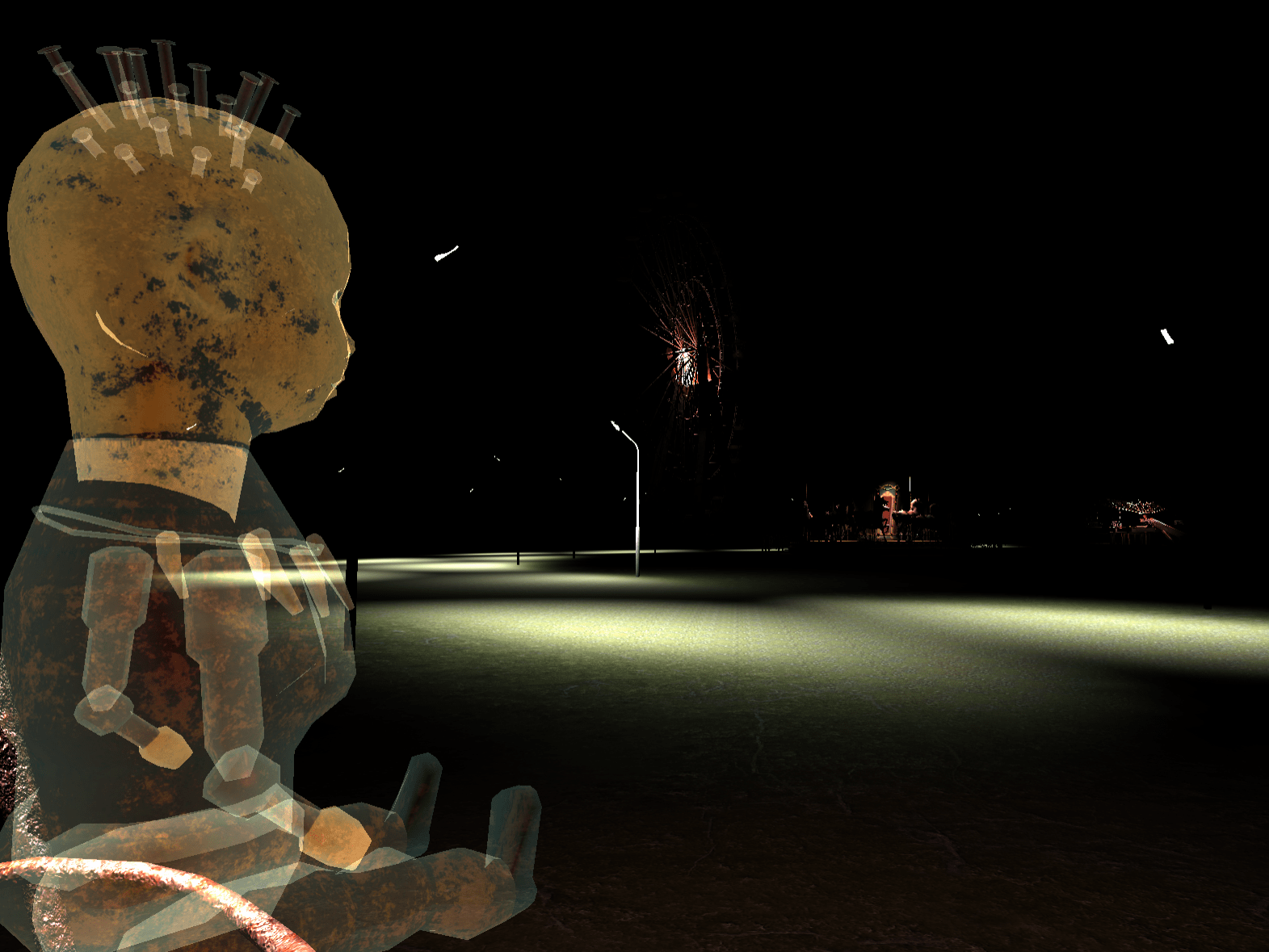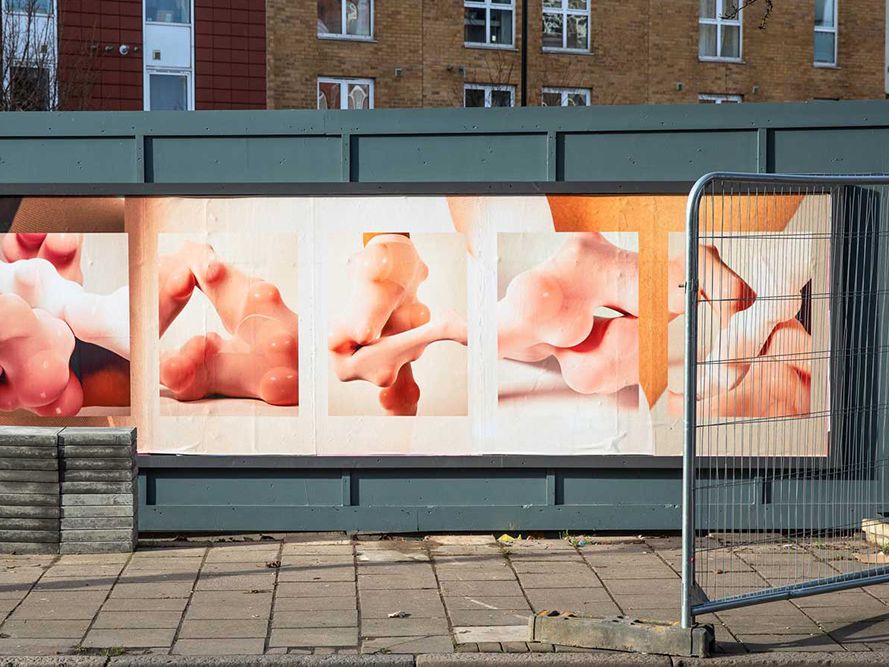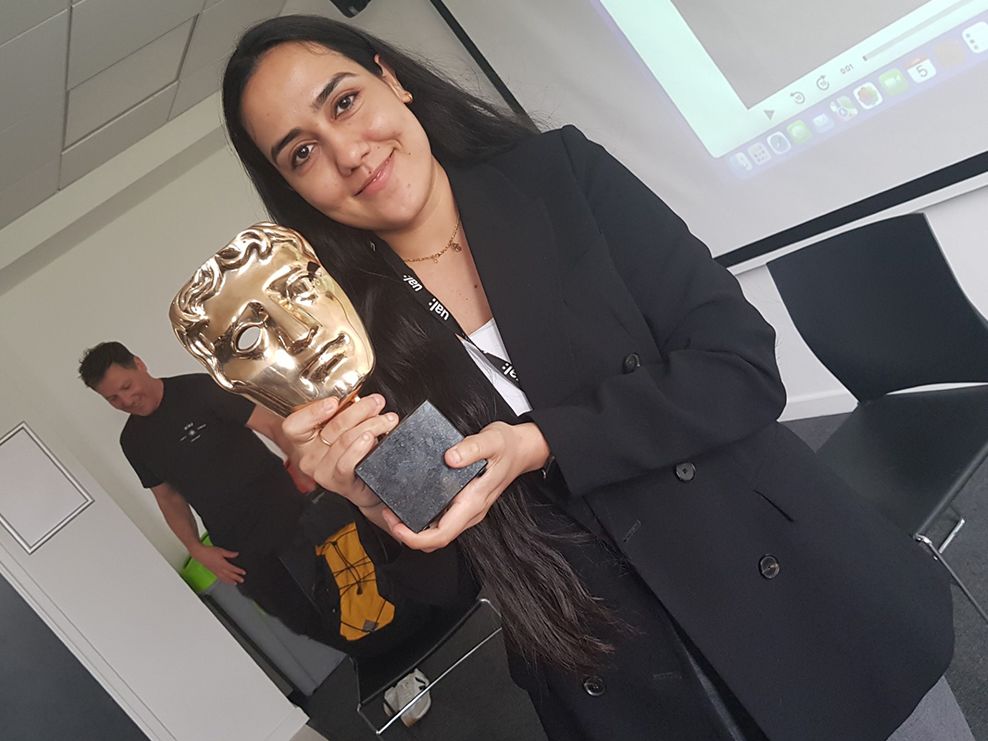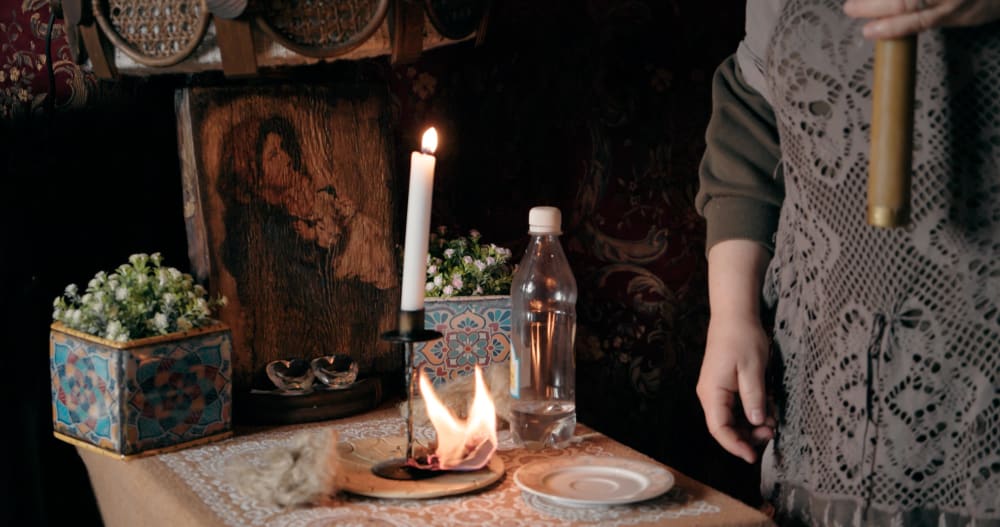
London College of Communication students win in three categories at the NAHEMI Student Film Awards 2023
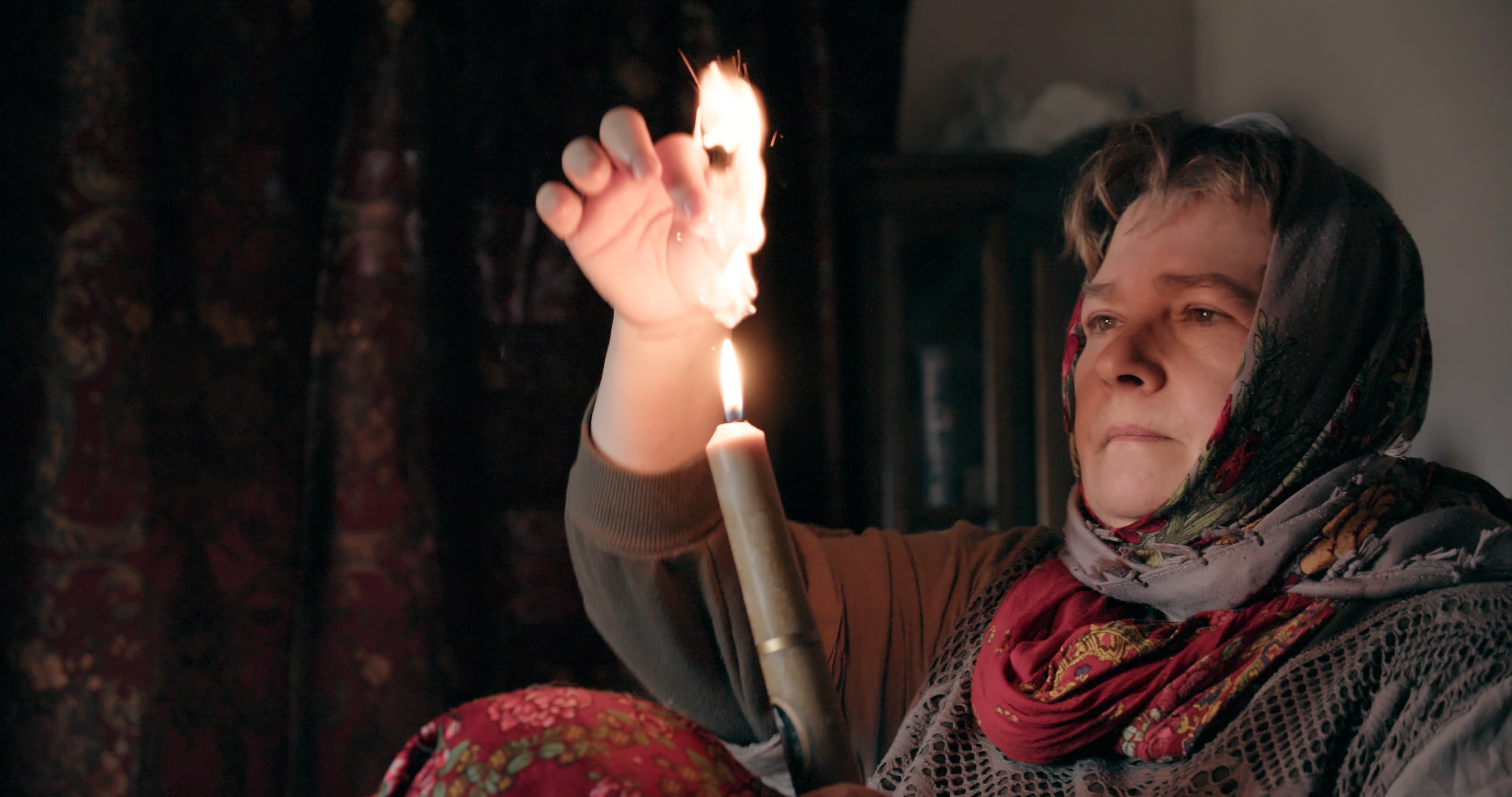
- Written byHenry Smith
- Published date 05 August 2024

The National Association for Higher Education in the Moving Image (NAHEMI) have recognised two films from London College of Communication (LCC) students in their Student Film Awards, celebrating the work of Ruozhang Liao, Edvin Cetyrkovski and Alexandra Golus.
Acting as a “forum for debate on all matters pertaining to the teaching of practice in the Moving Image”, NAHEMI organises a range of film festivals and awards, all concerned with promoting and celebrating student films.
Crush, an animation by Ruozhang Liao, tells the story of an astronaut who accidentally lands on the moon and witnesses Armageddon. The film won this year’s Sound Award and Animation Award.
Whisperers is a documentary that follows the latest generation of ‘whisperers’, a group of women healers who cast spells to free people from possession. Whisperers was a joint effort from director Alexandra Golus and producer Edvin Cetyrkovski, winning in the Factual Award category and scoring an Overall Runner-Up nod at the Awards.
We spoke to winners and LCC students Ruozhang, Edvin and Alexandra to find out what it’s like to create an award-winning film.

Tell us about your creative practice. Do you explore particular themes, or use particular tools and techniques?
Ruozhang: My way is to talk with my friends. We will have a long walk and I will tell them all the ideas I have, no matter good one or bad one. Then based on their reaction, choose one or two ideas to expand. I find “babbling” is a good way to practice creativity, because you will never know what will inspire you.
Alexandra: As a former portrait photographer and documentary filmmaker, my aim is to explore contradictions, while searching for the beauty in scars and imperfections. I love slow, long shots, 120mm film, and simplicity of the composition heavily inspired by the realism of Japanese post-war landscape and Polish folklore. I want my work to serve a higher purpose, that is also why I explore themes of folklore, culture and politics.
How did you first become interested in the field of film?
Ruozhang: When I was young, we had lots of DVDs of animated movies like The Lion King. At the time, we didn’t have a computer or smartphone, so I would just watch these animated movies over and over again. I guess that’s why I’m so fond of animation – it’s a deep connection to my childhood.
Alexandra: I fell in love with filmmaking in my early teens. Immersing myself with Tarkovsky, Zhang Yimou and Krzysztof Kieslowski’s work, I could taste the beauty of this world by looking at the screen. Cinema makes me feel alive.
What inspired the initial ideas behind your film, and how did you develop them further?
Ruozhang: It all started at the Turkish restaurant Efes. They serve tap water with a blue glass and round ice cubes. It looks just like the moon floating on the ocean. I started to think up reasons why the moon might float on water and what it might look like. Then I read Oscar Wilde’s Narcissus and I really connected with the concept of loving your own reflection. For me, it’s not only a way of expressing self-love, but it also tells me that when we like something, it’s sometimes because that thing or person reflects something in ourselves. I started to feel connected to the moon and this idea of self-love and from there I created Crush.
During the making of Crush, I asked for opinions from lots of lecturers at LCC. Half of my tutors thought the story was too “scientific” and the other half thought it was too “romantic”. It was quite funny to see the tutors argue with one another! The first draft of Crush was nothing like the final version that made it to the NAHEMI awards. The old version was half disaster film, half experimental animation!
Alexandra: Whisperers tells a story of female rural healers at the borders of Poland and Belarus. They cast spells and perform rituals to relieve people from evil possessions and illnesses. Despite its long tradition within Slavic culture, the topic of Whisperers remains quite controversial in Poland as it challenges the beliefs of the society and the dogma of the church itself.
I knew about Whisperers from a friend of mine who was healed by one of them. The community of female healers in Podlasie is slowly dying and so is their practice. I was lucky enough to get in contact with Elżbieta Kuc and Kora Brylińska, two remarkable Whisperers who invited us to their homes and showed us the beauty of their practice. This film wouldn’t be possible without them. It was truly an honor to learn from them.
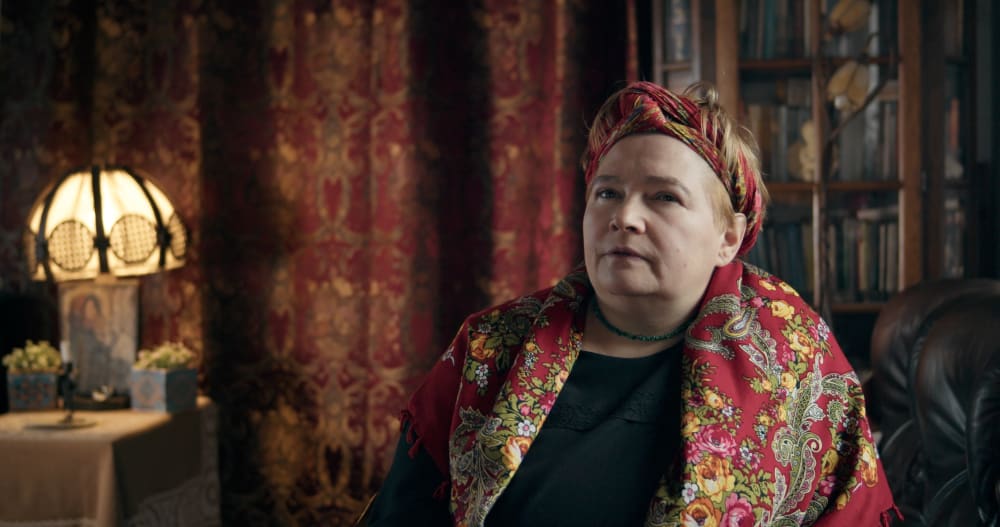
What role did you play in the development of the film, and what kind of activities did you take part in?
Ruozhang: I did most of the animations and the sound effects for Crush. To do this, I created storyboards and drew as many of them as I could in the limited time before submission. I planned the schedule on a week-by-week basis, and it really helped me to stay on top of things.
Alexandra: I pitched and directed Whisperers. My love for research allowed me to find the contributors, locations, potential musicians from the region and all the little details that made the documentary as authentic as possible. I don’t believe in strict hierarchy on set, therefore our small crew consisting of 5 people was equally respected and encouraged to participate in all stages of production. One thing I am most proud of is collaborating with course mates who had a similar vision and style of working to mine. We became a crew that could rely on each other. At times, all of us were stuck in the editing suite for weeks making small changes.
How has this production experience helped you to develop as a practitioner?
Ruozhang: Making a film on my own taught me a lot about the processes and issues that can come up with production. Now, I work as an animation tutor in China, but most of the time I’m more like a producer. I plan schedules and help people turn their ideas into animations in the most efficient way. I get a real sense of accomplishment helping people learn about creating animations. I think without the experience of Crush, I couldn’t be so confident about the animation industry.
Alexandra: Making Whisperers was the most intense and fruitful period of my time at LCC. It was only in my third year that I decided to go all the way in and pitch my idea – not to mention turning it into a reality. Faced with ongoing difficulties of shooting abroad and the dynamic nature of factual filmmaking, I’ve learnt how to work efficiently within a small crew and respect each other’s needs.
Research and preproduction are the key to success. You have to give yourself a space for potential mistakes and constantly adapt to the rapidly changing environment. Whisperers was a wild ride – shooting in below-freezing temperatures with border patrol on our backs showed me the beauty of factual filmmaking and the potential risks you have to foresee.
How did you find out about NAHEMI, and why did you decide to apply?
Ruozhang: I knew about NAHEMI from LCC News. The College encouraged me to send Crush to the NAHEMI awards, and I thought it would be a good opportunity for more people to see my work.
Edvin: We had earmarked NAHEMI as one of the festivals we aimed to get into. We were in close contact with LCC’s Festival Coordinator Mary Davies in order to maximise our chances of being featured. Fortunately, we got our chance to show off Whisperers and it was great to be mentioned as one of the winners.

What does being recognised by NAHEMI mean to you?
Ruozhang: I think it’s awesome because it means I get to represent LCC – it’s a real point of pride for me. It gives me more confidence to keep creating and it feels great.
Alexandra: I feel honoured and grateful to be recognised. As a documentary filmmaker I realise how difficult it is to promote your film with the same level of excitement as scripted films. Whisperers is my debut, but more importantly an ethnographic portrait of rural healers, who perform an ancient art of whispering. I am beyond happy that NAHEMI recognized the beauty and importance of our documentary.
What have you most enjoyed about your time as an LCC student so far?
Ruozhang: There are lots of interesting machines in LCC like the screen printing machines and high-performance computers! I really enjoy using them – I’m always discovering new effects and techniques to work with. I have found it very useful for my creative practice.
Alexandra: It was a significant period of my life. Stuck in between lockdown and grief due to the loss of my father, I found myself struggling to push my artistic practice while exploring other departments of film. Looking back, I am grateful for the wonderful people I’ve met at LCC and how flexible the course was, allowing me to take on different roles at my own pace. I’ve learned a lot not only about filmmaking but myself, as a creative within the world of film.
I also loved the opportunity to collaborate with not only my course mates, but students from different departments. Everyone holds a unique story inside their hearts. I am grateful for finding friends for life at LCC.
What tips would you give to prospective students who are interested in exploring the world of film?
Ruozhang: One; try not to set your ambitions too high. Once you set these lofty ambitions you put a lot of pressure on yourself, and it robs you of the joy of creating. Two; try to create as much as possible, not just when you have good ideas. On the one hand, it can help you practice; on the other hand, sometimes you’ll make something that surprises you!
Alexandra: Don’t be afraid to put yourself out there. Be bold, patient and creative. Exploring other mediums of art (emphasis on photography and poetry) will help you establish your own style and language in film. Look for inspiration within your own story, culture and roots.
Related Links
- Learn more about the NAHEMI Student Film Awards 2023.
- Discover our Screen School.
